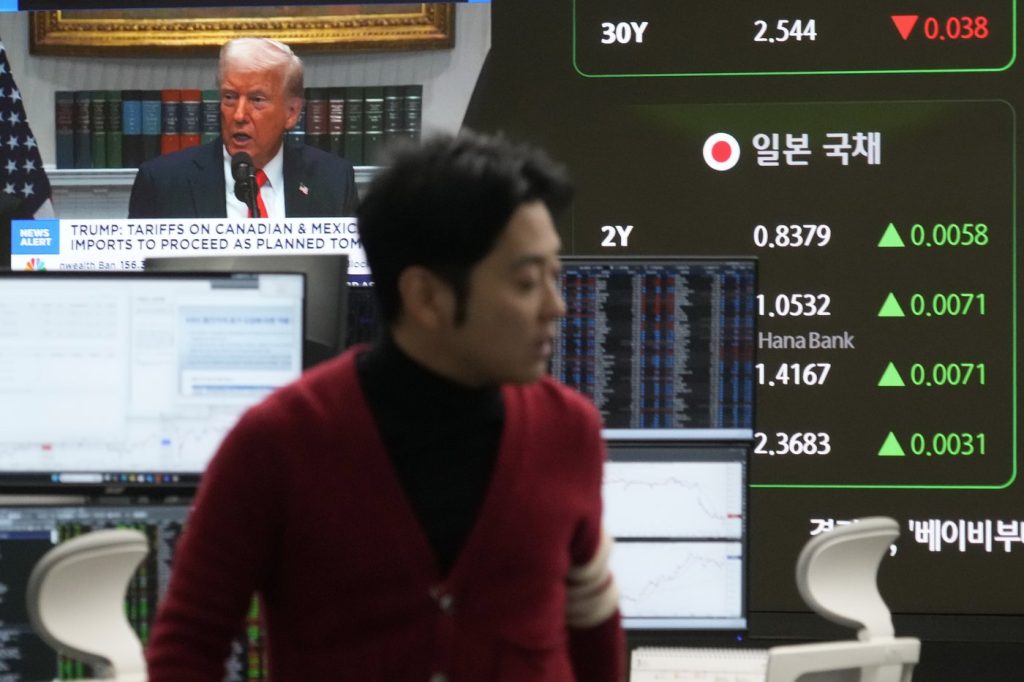BANGKOK (AP) — Asian stock markets opened lower on Tuesday following a substantial decline in U.S. stocks, which occurred just before a new set of tariffs was implemented by U.S. President Donald Trump. A 25% tariff on imports from Canada and Mexico came into effect early Tuesday, while an additional 10% tariff was announced for Chinese goods. In response, Chinese state media suggested that Beijing might retaliate, possibly targeting American agricultural products and food exports, as China is a significant importer of U.S. soybeans and various other agricultural items.
On Tuesday, Japan's Nikkei 225 index dropped 1.9%, closing at 37,084.83, while Hong Kong's Hang Seng index fell by 1.6% to 22,666.68. The Shanghai Composite index experienced a slight decline of 0.2%, settling at 3,310.35. In South Korea, the Kospi climbed marginally, up less than 0.1% to 2,533.77, while Taiwan's Taiex decreased by 0.9%. Stock markets in most Southeast Asian countries also reported declines.
On Monday, volatility struck the U.S. markets, with the S&P 500 index falling 1.8% to 5,849.72. This drop came after Trump stated there was "no room left" for negotiations regarding tariffs set to commence on Canadian and Mexican imports. Prior to this announcement, Trump had postponed these tariffs in an effort to facilitate further discussions.
The Dow Jones Industrial Average saw a decrease of 1.5%, closing at 43,191.24, while the Nasdaq composite plunged 2.6% to 18,350.19. Investor optimism on Wall Street waned as hopes diminished for a less drastic approach to global trade by the Trump administration. The recent downturn lowered the S&P 500's gains since Election Day to just over 1%, compared to a peak of more than 6%, which had largely been fueled by expectations of economic policies from Trump that would enhance the U.S. economy and business environment.
The S&P 500 had set a record in February, buoyed by better-than-expected earnings reports from major U.S. companies. However, the market began its descent following disappointing economic data, including growing pessimism among U.S. households regarding inflation and the potential impacts of upcoming tariffs.
The latest economic data, released on Monday, indicated that U.S. manufacturing activity continues to grow, albeit at a slower pace than anticipated, with a notable contraction in new orders. Prices in the sector are rising amid ongoing discussions regarding who will bear the burden of Trump's tariffs. Following the manufacturing report, the yield on the 10-year Treasury fell to 4.16%, down from 4.24%, reflecting increasing concerns over the possibility of a slowing U.S. economy.
The recent downturn in the market has particularly impacted stocks of companies that once thrived, such as Nvidia, which saw a significant drop of 8.8%, and Tesla shares, which fell by 2.8%. Additionally, stock values for other entities linked to the cryptocurrency economy, which had initially risen earlier due to positive news from Trump regarding a crypto strategic reserve, turned downward, with MicroStrategy losing 1.8% and Coinbase dropping 4.6%.
Meanwhile, European markets edged higher on Monday as an easing of inflation data emerged, with Germany's DAX index soaring by 2.6% and France's CAC 40 gaining 1.1%. Despite the pressures from Trump's "America First" policies, stocks outside the U.S. have largely outperformed the S&P 500 this year.
In other trading on Tuesday, U.S. benchmark crude oil prices slipped by 30 cents to $68.07 per barrel, while Brent crude fell by 51 cents to $71.11 per barrel. The U.S. dollar also weakened against major currencies, trading at 149.29 Japanese yen compared to 149.50 yen. The euro decreased slightly to $1.0484 from $1.0488. Additionally, Bitcoin prices dropped to $83,750, a decline of 10.3% according to CoinDesk.










